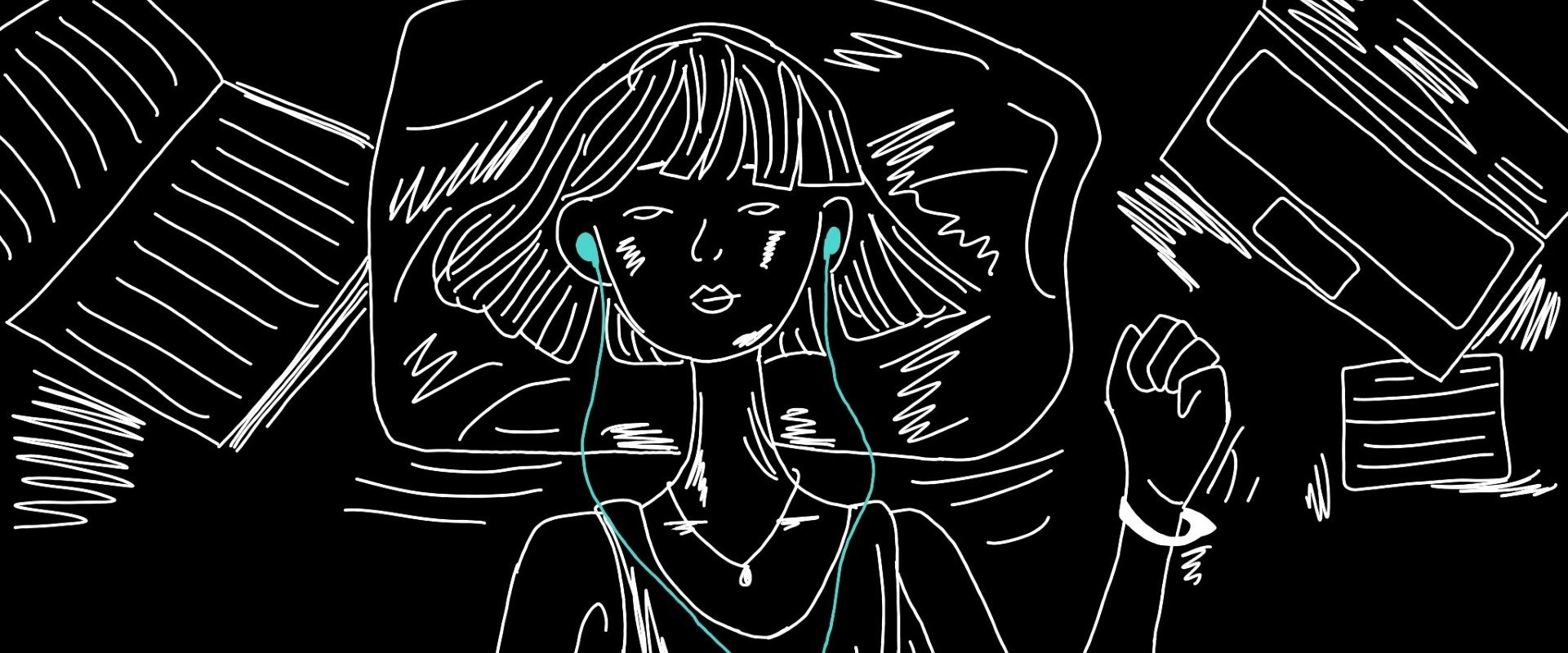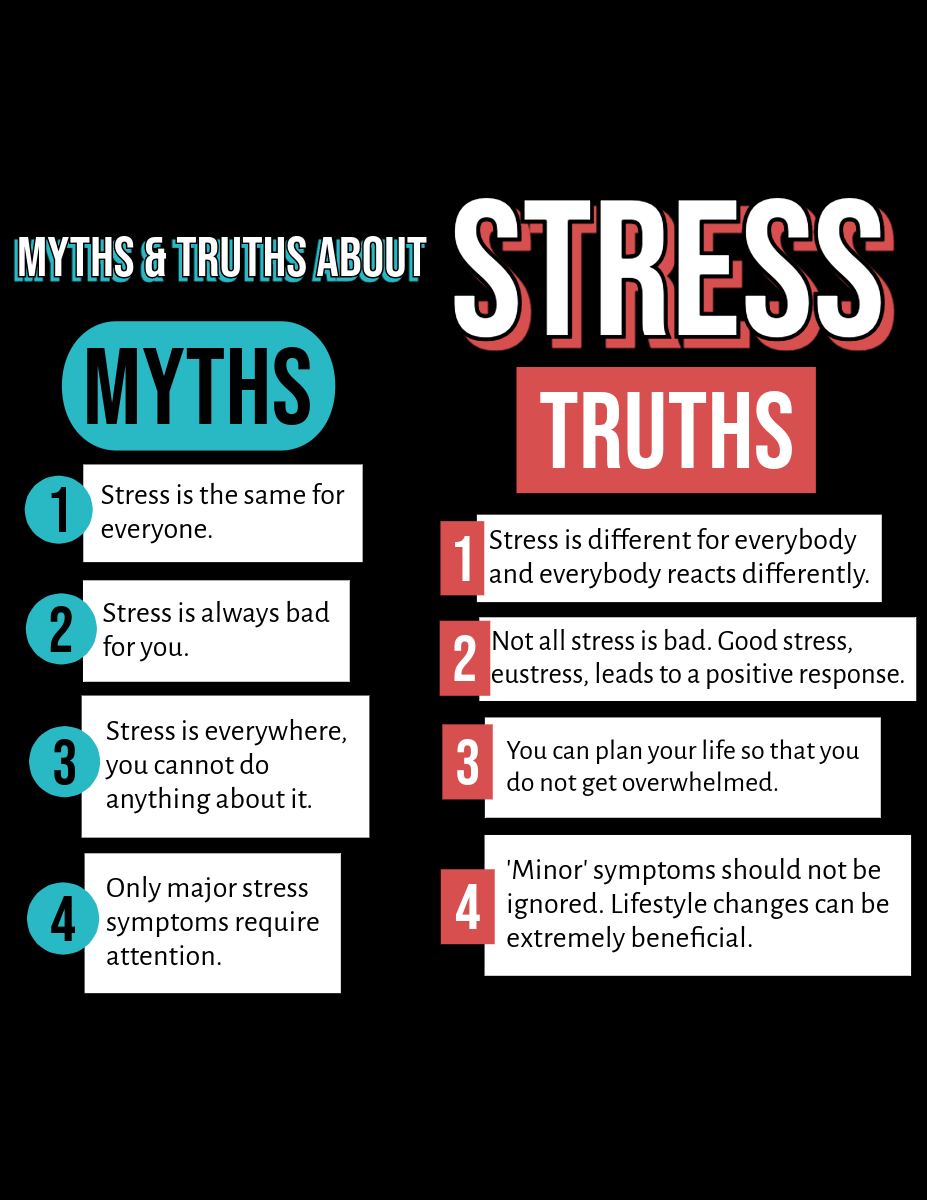Music tames the savage beast


“I honestly listen to music in order to get away from my thoughts.” – Alana Graban (12)
“Make a list of priorities or a schedule and crank out what needs to get done first.” – Spencer Beckett (12)
“I watch movies or draw.” – Sarah Williams (12)
“Listen to music.” – Owen Costa (10)
“Go fishing and listen to music.” – Braden Rockwell (12)
“Talk to friends or do something fun to get my mind off it!” – Kate Kuns (9)
“Listen to sad music or love music.” – Angel Riffle (10)
Having a whirlwind of thoughts rushing through your brain like unrelenting waves can be considered one of the worst feelings one can experience. Stress comes in all different forms from headaches to full-blown panic attacks. No matter the fever, stress is not something to take lightly.
Types of Stress:
However, not all stress is necessarily bad. There are two categories of stress: eustress and distress, according to Medical News Today. Distress is the type of stress that affects you negatively, this is demotivating, long-lasting and chronic stress. It is anxiety-inducing and can decrease performance and cause physical and mental problems.
Eustress, on the other hand, is stress that can have a positive effect on you, according to Medical News Today. It is challenging yet rewarding which energizes and motivates us to make a change. It is infrequent and doesn’t last long, but when it does occur you may feel excitement to do something and improve your performance.
“Eustress is typically seen as positive life events but they still cause stress like the birth of a child or marriage,” AP Psychology teacher Adam Teeters said. “We still like doing these things but they are a stressful life event. Whereas with distress it is something we look at as negative like finals and we do not want to go through anything that causes that type of stress.”
“Currently eustress comes from my college endeavors since I have to think about all the things I have to do between now and then,” elaborates Granville High School senior, Sydney Ley. “I’m excited about what’s to come but there is also a fear of the unknown that can be overwhelming. Combined with this daunting excitement, there also comes distress with the work necessary to complete my college application process, midterm studying with 4 AP classes, while also trying to balance my time with friends and family.”
Having eustress or distress is a completely independent experience that is specific to a single person, according to Medical News Today. One thing that gets another person excited and ready for a challenge may terrify someone else and give them intense anxiety. To promote eustress, what’s key is to change your mindset into one that welcomes change and challenges; something as simple as playing games or doing puzzles.
What happens when you are stressed:
Have you ever found yourself with a stomach ache while stuck in traffic or your heart rate rising while watching a scary movie? Then you would know that stress not only affects the mind but the body as well, according to the American Psychological Association. This is an automatic response that was meant to protect our ancestors from danger.
“If you’re stressed, what you have being released into your body is cortisol which is a hormone that puts you in an alert state of alarm, puts you on edge,” says Teeters. “Long-term exposure to cortisol can be very damaging to the body in terms of physical illnesses and maybe longer cardiovascular and things like that.”
When stress starts to interfere with your ability to live a normal life it becomes even more serious, according to the American Psychological Association. When you begin to enter a long-term state of stress you become even more prone to a variety of physical and mental health problems, including anxiety, depression, heart attack, high blood pressure, stroke and sleep problems.
Thinking about reducing your stress in a given moment may be considered inconsequential but in reality, it could protect your health in the long run, according to the American Psychological Association. Researchers recommend boosting your happiness and dropping your cortisol levels by doing things that you love.
How Music Can Help:
One of the easiest and most efficient ways to lessen stress is to listen to music that you enjoy listening to, according to Teeters.
“When you listen to music, particularly something that you enjoy, it doesn’t have to be classical or anything like that, just something that you enjoy, you’re putting yourself into a situation where you’re happier and so your cortisol levels drop,” explains Teeters. “There’s been a number of studies where worker productivity picks up if they have been listening to music, mental health is beneficial and physical.”
Many have thought in the past that a specific type of music may help with stress more than others but this has yet to be proven.
“There were a bunch of studies done back in the 1990s about classical music helping neurodevelopment and makes stronger connections conginitely but that hasn’t necessarily been proven to be true,” Teeters said. “If we’re just talking about stress and well-being it’s whatever music you enjoy so hip-hop, country, gospel, rock, do what you want.”
Another aspect of how music helps is taking yourself out of the situation in which you are completely succumbed in your stress, according to Teeters. If you focus on something else then the stress that you feel will lessen.
“That’s also what is going on here with stress; it’s getting your mind off of things,” explains Teeters. “So whether you’re less focused on what’s causing you stress and more focused on the music and lyrics or more focused on the task at hand of playing the instrument, music can get your mind off of your worries and get your mind on what you enjoy.”
English teacher and church choir singer Sarah VanVulkenburg also uses music as an outlet for stress.
“I guess it adds another space for me,” says VanVulkenburg. “In most areas of my life, I’m giving and doing something for somebody else. So music, when I’m listening to music, I’m being given something, and that doesn’t happen in many other places of my life. But it does either let me isolate a little bit or just release any emotion I need to.”
“Sometimes when I’m doing homework and stressed I’ll take a break to listen to a couple of songs that make me happy,” details Ley. “Listening to music that has happy memories connected to it allows me to remind myself that stress is not forever.”
“I think everyone knows that there’s always music on in my classroom,” expressed Teeters. “Even sometimes when I am teaching important stuff and I don’t know if people find that distracting or if people find it relaxing or if people care for it or not. I find it beneficial because it puts me in a state of relaxation and it makes me feel more at home, more comfortable and I want the students who come in here to feel at home as well. I think people just kind of relax when they hear music.”
Your donation will support the student journalists of Granville High School. Your contribution will allow us to pay for our annual website hosting costs.













